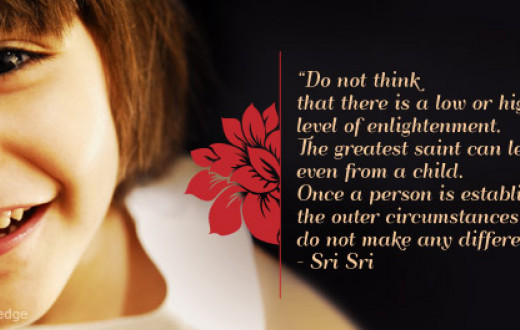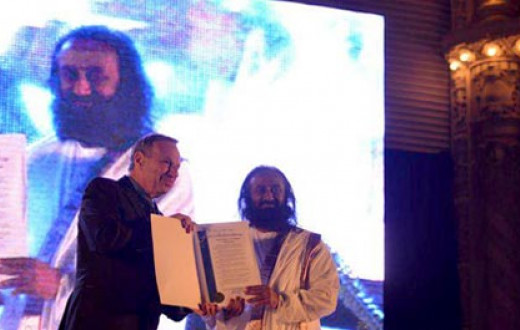Bangalore, India

Gurudev, in your book titled Living the Mystery of Life, you have said, 'Work in this world but do not allow it to enter your head.'
Can you please explain this once again. Is it the same thing as dispassion?
When the eyes are open, we see the scenery, and when we close our eyes and our mind then there is another world. Did you notice this?
So meditation is the way.
See, suppose you are sitting and thinking, ‘Oh, my daughter-in-law did this. My son did not respect me, etc.', you can sit and think about this the whole night, the whole of the next morning and the whole of the next day and it will all just bother you.
What I am saying is, whatever they did, let it be out there. When you close your eyes, you be in your space. Do not let the world outside bother you.
It is difficult, I know, it is not that easy. But that is the direction we must proceed in.
There are two worlds, and the truth is in between the two worlds. One is called Manorajyam – the kingdom in one's own mind. The other is the Samaaj – the external world environment. Between the Samajam and the Manorajyam is the truth.
See, in the recent poojas, why have they used so many musical instruments? A huge noise was being made by the cymbals, the naadaswaram (a classical South-indian musical drum) was being played, the chanting was going on, someone was banging. A lot of noise was being made on the outside so that the mind stops thinking inside.
So there are many ways. It is with the use of some skill that we have to bring the mind to the centre.
We cannot complain about this, for that is how the mind is. Sometimes it latches on to totally insignificant and silly things and that is how it is. That is why the mind is sometimes unfathomable.
In the Bhagavad Gita, Arjuna tells Lord Krishna, ‘This mind is like a monster. I cannot control it, it does not listen to me.'
Lord Krishna says to him, ‘Definitely, I agree with you.’
But in the end He says that there is a way.
• Sama (calmness or quietude of mind)
• Dama (self-control or restraint of the senses)
• Uparati (satiety)
• Titiksha (power of endurance)
• Shradha (faith), and
• Samadhana (equanimity or one-pointedness of the mind)
This is what you must focus on increasing more in your life. By enhancing these virtues, your capacity to receive blessings will increase.
Among the four pillars of knowledge, the third one that has these six wealths, that is what we must increase.
Also we must do Seva (service) and Sadhana (spiritual practices).
You know, there is a saying, ‘Without getting any benefit, nobody will do anything’.
A dull person will not do anything unless he thinks he is going to get something out of it. So the Rishis of the ancient days knew this and that is why they added the Phalashruti to tell you that by doing this, you will get so-and-so benefits. That is why it is called Apara. Apara Vidya is one in which you always attach some benefit to the practice. Subtler than that is Para-para, and ultimately there is Para Vidya where none of this matters at all. There is no means to attain Para Vidya.
When Rajoguna dominates, there are conflicts.
When Satguna dominates, there is awareness, knowledge and happiness.
You should observe which is dominating, since that is what gives quality to that time.
When you are in knowledge, then also fate changes.














































